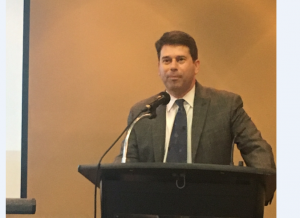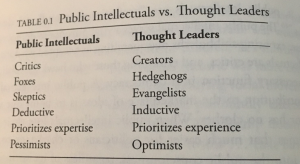I had the privilege last night of seeing Dan Drezner give the inaugural Barton Lecture at Carleton’s Norman Paterson School of International Affairs in Ottawa. His lecture was a condensed version of the argument of his book The Ideas Industry, and while I’ve read the book, the talk was useful. It’s often interesting to see people give book talks, since you get a better sense of what they think their book is about.
Drezner begins with a paradox: Everyone laments the decline of the public intellectual in our civic discourse, and yet, via outlets such as TED and related Big Ideas type lecture series’, the demand for ideas has never been greater. Drezner squares this by distinguishing two types of ideas industry labourer: Public Intellectuals and Thought Leaders. They break down as follows:
What Drezner argues, in a nutshell, is that public intellectuals have been largely eclipsed by thought leaders, so that people like Niall Ferguson and Fareed Zakaria now dominate.… Continue reading


